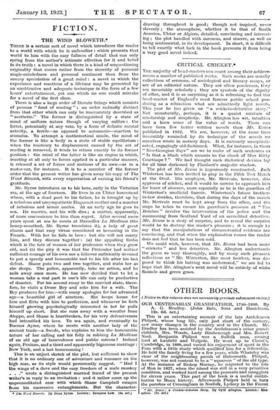FICTION.
THE WIND BLOWETIL* THESE is a certain sort of novel which introduces the reader to a world with which he is unfamiliar • which presents that world to him with the easy fullness of detail that can only spring from the author's intimate affection for it and belief in its truth : a novel in which there is a kind of unquestioning originality that comes rather from the sincerity of personal single-mindedness and personal sentiment than from the uneasy speculation of a great mind : a novel in which the experience and reactions of a lifetime may be presented by an unobtrusive and adequate technique in the form of a few hours' entertainment, yet one which no one could mistake for a novel of the first class.
There is also a large order of literate beings which consists of persons " fond of reading " ; an order radically distinct from that other which can only be inaccurately described as " aesthetic." The former is distinguished by a state of mind of uniform nature though of varying calibre : the latter, potentially at any rate, by a form of definite mental activity, a fertile—as opposed to automatic—reaction to stimulus. To attempt a mathematical simile, the mind of the former is like a. body in a state of stable equilibrium : when the tendency to displacement caused by the act of reading is removed, it tends to return exactly to its former position : the mind of the latter is like an engine in which, reacting at all only to forces applied in a particular manner, is released a set of forces and motions of its own—as in a motor-car, for instance. It is to a member of the former order that the present writer has given away his copy of The Wind Blozveth, with every expectation of earning his friend's gratitude.
Mr. Byrne introduces us to his hero, early in the Victorian era, at the age of fourteen. He lives in an Ulster homestead where, with a dead poet to his father, he is brought up by a nebulous and unsympathetic Huguenot mother and a number of nebulous and heroic uncles. At an early age he goes to sea. He marries, and his wife dies ; a matter, apparently, of more convenience to him than regret. After several more years spent at sea he meets at Marseilles La Mielleuse (the honey-mouthed, Mr. Byrne translates it), a lady of great charm and that easy virtue considered so becoming in the French. With her he falls in love : but she will not marry him, and they discuss together : (a) the appalling limbo which is the fate of women of her profession when they grow old, and (II) the pity it was that the Pretender had neither sufficient courage of his own nor a follower sufficiently devoted to put a speedy and honourable end to his life after his last defeat. Shane puts two and two together, and stabs her as she sleeps. The police, apparently, take no action, and he sails away once more. He has now decided that to let a woman take a real part in one's life can only be productive of disaster. For his second essay in the married state, there- fore, he visits a Druse Bey and asks him for a wife. The Bey produces for him—with many apologies for her advanced age—a beautiful girl of nineteen. She keeps house for him and flirts with him to perfection, and whenever he feels himself growing psychologically interested in her he pulls himself up short. But she runs away with a wrestler from Aleppo, and Shane is heartbroken, for his very defensiveness had intensified his love. To sea again, and eventually to Buenos Ayres, where he meets with another lady of the ancient trade—a Swede, who explains to him the honourable nature of her calling and his folly in robbing La Mielleuse of an old age of benevolence and public esteem I Ireland again, Fenians, and a third and apparently bigamous marriage : New York, and a last homecoming
This is an unjust sketch of the plot, but sufficient to show that it is no ordinary one of adventure and romance on the high seas, as its style would persistently suggest. " Had I the wings of a dove and the easy freedom of a male monkey . . ." wrote a distinguished married friend of the present Writer's in reply to an invitation : and it rather sums up the unpremeditated ease with which Shane Campbell escapes from his successive entanglements. But the character-
• Ths Wind Biotoeth. By Donn Byrne. London: Sampson Low. Os. netl drawing throughout is good; though not inspired, never slovenly ; the atmosphere, whether it be that of South America, Ulster or Algiers, detailed, convincing and interest- ing ; the plot handled with sureness, and sincere, as well as being sentimental, in its development. In short, it is difficult to tell exactly what lack in the book prevents it from being a very good novel indeed.














































 Previous page
Previous page